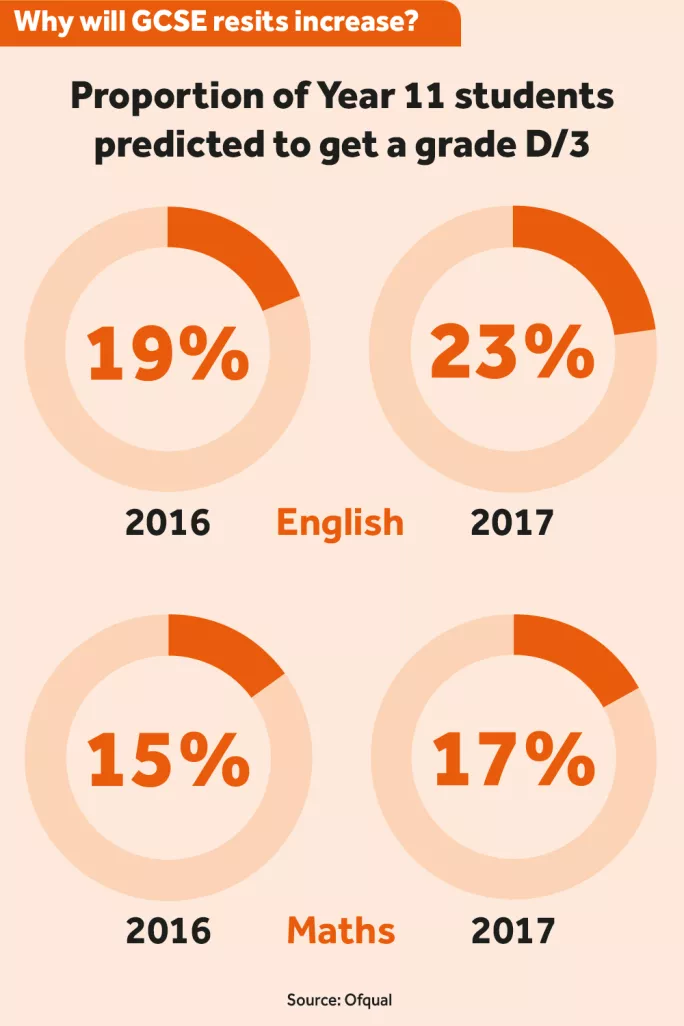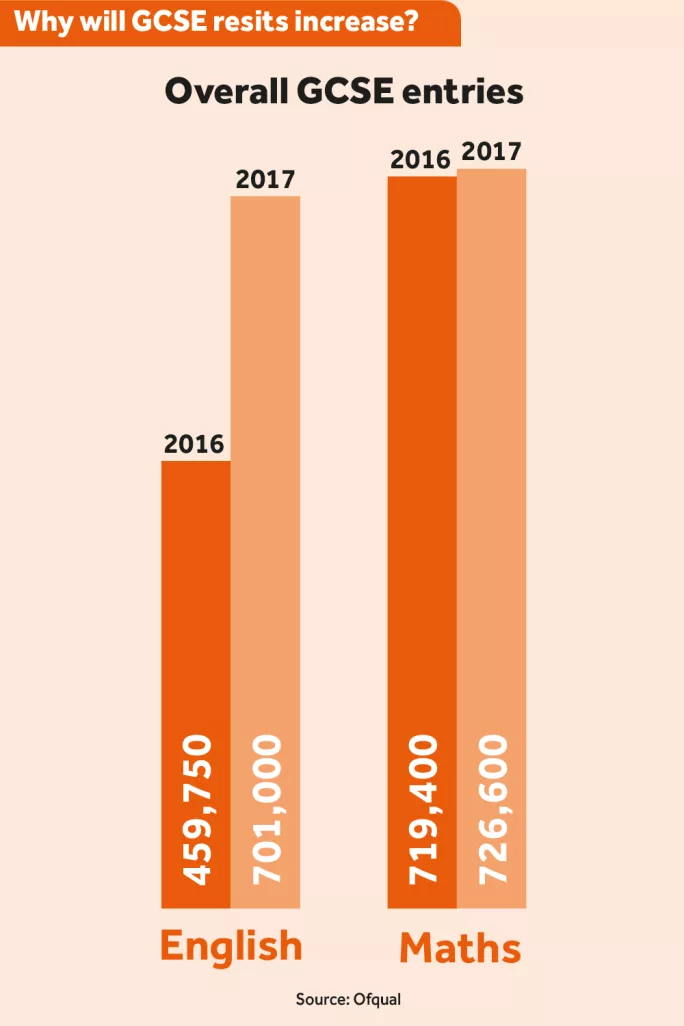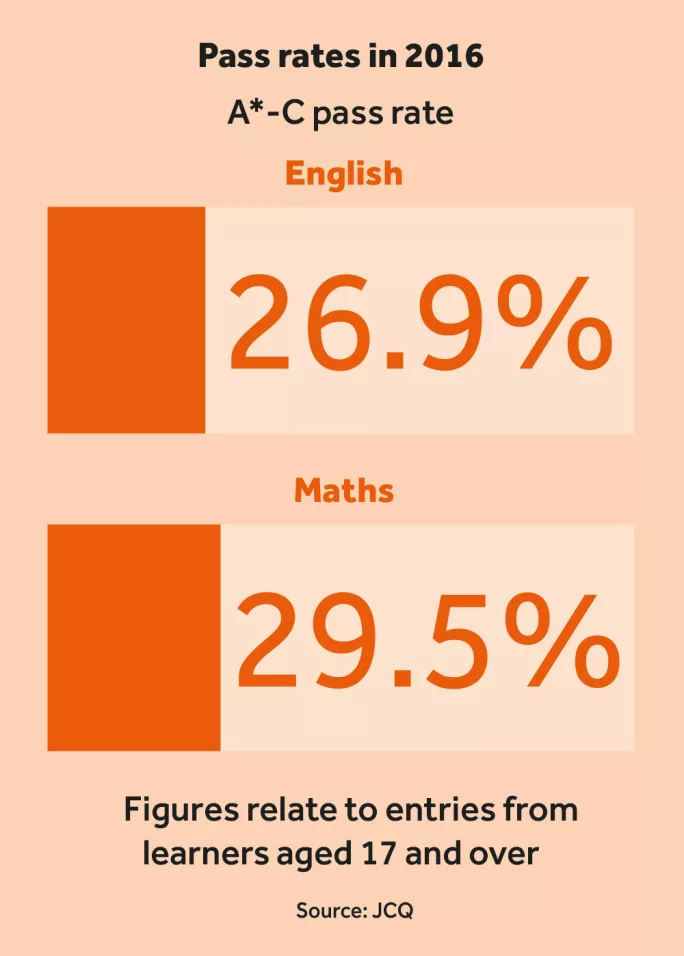New GCSEs, same problem: resits set to rise again

Since the compulsory GCSE resit policy was introduced, colleges have seen a dramatic increase in the number of learners taking English and maths.
Across all age groups, this summer there has been a record 1.4 million entries in the two subjects - with almost 230,000 of these being from college students.
But this year’s results will be unusually difficult to unravel. This summer saw both the first cohort of students sit the reformed GCSEs (graded from 9-1), and the final cohort take resits under the legacy version of the qualifications (graded A*-G).

Despite speculation that the condition of funding for post-16 institutions - which effectively makes resits compulsory for those students who obtained a grade 3 or D - would be relaxed this summer to make functional skills available as an alternative qualification, no change was forthcoming (see box, below).
And the challenge facing FE providers is set to become even greater from September. The number of 16-year-olds obtaining a grade 3 in English or maths this summer is predicted to be 89,000 higher than the number who achieved a D last year. This means that next year’s resit cohort is likely to be tens of thousands bigger than this year’s.
There are two reasons for the expected increase. Firstly, the change in the grading system is expected to result in a higher proportion of entries being awarded a grade 3 than previous received a D.
Secondly, the number of GCSE English entries has increased by 241,000.
Catherine Sezen, senior policy manager at the Association of Colleges, says that the extent of the growth in the resit cohort for 2017-18 is not yet clear, but colleges are planning for a sizeable increase.
“Colleges are aware of that, and they are preparing for it,” she says. “As always, colleges will rise to the challenge. They will have been planning for additional numbers and potentially more GCSE courses, along with fewer functional skills courses.
“Does it put pressure on colleges? Yes, because it puts pressure on them in terms of staff … You are delivering more hours to those students who would have previously been taking functional skills. And at exam time there will be logistical issues.”
‘Expensive’ support
At some colleges, as many as a third of students require additional support during exams, Sezen adds, such as extra time or someone to transcribe their answers for them. “You want to meet the needs of the learners, and you want to cater to their individual learning needs, but that is expensive,” she explains.
The increase in English entries can be attributed to the end of combined English (language and literature) under the reformed qualification and the fact that IGCSEs are no longer included in school league tables, prompting many to switch back to GCSE English.

City College Norwich has one of the largest resit cohorts in England. In 2016, the college used six buses to transport hundreds of students to a makeshift exam hall at the Norfolk Showground - the only building in the city that was big enough - while hundreds more students with special access requirements sat their exams on the college site. This year, there were 1,962 entries across both subjects, a similar number to last year, explains deputy principal Jerry White.
“As with most colleges, we have had to plan for September, building flexibility into the numbers of students who may retake GCSEs,” he says. “This is due not just to the new GCSE grading system but also to the continued commitment to always place the student on the correct programme for their prior ability and their aspirations.
“Irrespective of what the condition of funding says, we will continue to do the right thing to maximise the progress every student makes in their English and maths skills.”
‘Demotivating learners’
The resit cohort at West Suffolk College has also remained stable, with 1,285 resit entries this year, says vice-principal for curriculum and quality Lindsey Johnson.
But with numbers expected to rise in September, the college is recruiting two additional GCSE maths teachers and one teacher of English.
Johnson is calling on education secretary Justine Greening to relax the condition of funding rule to “enable the FE sector to choose the most appropriate maths and English qualification for students”.
“Whilst laudable, it is crippling an already beleaguered sector and, more importantly, it is demotivating a significant proportion of young people who require technical maths and English skills,” she adds (see box, below).

The AoC also backs a change in the resits policy. “We still believe that the condition of funding means that not every student’s needs are being met,” Sezen says.
“We need more flexibility. For some students, it becomes a real barrier to engaging with the rest of their curriculum, because they have had such a negative experience [at school].”
A Department for Education spokesperson says it does “not expect the new grading system to have a significant effect on the numbers of pupils reaching or falling below the expected standard”.
“The department and Ofqual have issued a wide range of resources since 2014 to help raise awareness of the new grading system, which is part of our drive to continue raising standards so every child is taught the knowledge and skills they need to succeed in life,” the spokesperson adds.
Register with Tes and you can read two free articles every month plus you'll have access to our range of award-winning newsletters.
Keep reading with our special offer!
You’ve reached your limit of free articles this month.
- Unlimited access to all Tes magazine content
- Save your favourite articles and gift them to your colleagues
- Exclusive subscriber-only stories
- Over 200,000 archived articles
- Unlimited access to all Tes magazine content
- Save your favourite articles and gift them to your colleagues
- Exclusive subscriber-only stories
- Over 200,000 archived articles